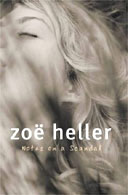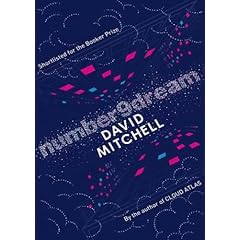 I'm still playing catch-up on 13th June's Weekly Geeks. I know, I know, it's been about a month, and that's ample time to catch up! However, after this, I'll just have two more to do: Disgrace, and His Dark Materials. Am planning to re-read the latter this month, so might end up doing that one after!
I'm still playing catch-up on 13th June's Weekly Geeks. I know, I know, it's been about a month, and that's ample time to catch up! However, after this, I'll just have two more to do: Disgrace, and His Dark Materials. Am planning to re-read the latter this month, so might end up doing that one after!
Anyway, on with it...
From gautami tripathy:
The Handmaid’s Tale is one of the best books I have read. What did you think of it? Do you think it is possible? Can you see a future like that? Did it scare you?
I thought it was fantastic. It's well-written, a page-turner, and depicts a heavily dystopian futuristic society, which scared the living daylights out of me!
However, when you ask if I find it possible or not, I have to say, I don't. Maybe, it's only me, but I find the dystopias presented in 1984, Brave New World, and Fahrenheit 451 much more realistic than this. I know people have found this book scarily possible, but, in my opinion, the human race has progressed way too much, to let women be reduced to nothing but maids and handmaids ("Handmaids" are women who have only one purpose: conceive a child for the family that looks after her). With each generation, women are becoming more powerful, and more career-oriented, at the expense of not having families, and settling down. The world is becoming smaller, and the cries of democracy are louder than ever. I just can't see the government of the United States being overthrown, and replaced by this totalitarian nightmare. That said, I can see this happening in some extremist countries, where women are not allowed to drive, vote, or leave their house without a man.
I am not American, but, with today being 4th of July, one has to ask the question: can the 'leaders of the free world' ever be the polar opposite?
The book scares me. I think Offred, the protagonist, said something along the lines of many handmaids tend to commit suicide, instead of living life as they do - under constant pressure and no guarantees. To be honest, if I was ever unlucky to exist in a society like that, I'd probably just kill myself. Luckily, I don't think something this horrible will happen in my lifetime. For that, I'm grateful.
From Maree:
I loved The Handmaid’s Tale – did you find it scarily possible?
I didn't. I just can't see a society like that coming into existence. Maybe I'm in denial. Maybe I'm an optimist. But... I just don't see it!
From Kristen:
I have a slight fear of reading Margaret Atwood again – she’s so revered in Canada that it’s intimidating. Talk me into why I should read the Handmaid’s Tale :o)
Jeez, I'm not very convincing. :( I'll try though...
Atwood is probably revered in Canada for a reason: she's that good! That should be reason enough to read the book. What makes this book really special, is, realizing how lucky we are, as things stand. Feminism is rampant right now, and women are allowed to make their own decisions, with respect to what to wear, and when to settle down and have kids. Their choice isn't restricted to being a 'martha' (a maid), or a handmaid. Can you imagine having to flip a coin between those two options, and nothing else?
It's well-written, it's a page-turner, and Atwood's made the story as real as possible: from Offred being your regular American woman, to feeling semi-conscious seeing Japanese tourists in shorts (revealing their legs). Can people be conditioned that easily? Or, in a society where there are no choices, people just accept things the way they are to make their life that much easier? It raises some provocative questions, which you probably don't want to think about, and which will haunt you for a long long time.
Did I do a good job of talking you into it?
From Rebecca:
The Handmaid’s Tale haunted me for weeks after I read it. I loved it and don’t think I’ll ever forget it, but I know that not everyone feels that way. What was your reaction to it? Did you find it believable and frightening or too futuristic and extreme? How would you describe it in 1 or 2 sentences to someone who’s never heard of it before?
As already mentioned above, it scared me. A lot. More than I want to admit. I can't imagine ever living in a society like that, and frankly speaking, death might be more viable. But... I also thought it was out and out fiction, and too extremist to be 'real'.
Two sentence summary:
The United States has been replaced by the Republic of Gilead, a futuristic society, where women are reduced to being 'reproductive' machines for unknown men, and then give up the child to the wife of these men. Everyone knows what their purpose is... and ironically enough, most other women envy the 'handmaids' for the alternative is being a maid, and not being treated with dignity or respect.
From Jodie:
Why do you think so many dystopian novels set in the future find women subjugated once again? What did you think of the rich women’s complicity in the other women’s fate in The Handmaid’s Tale?
I don't know. Will we do the full 360, and go back to the beginning, where women are subjugated for their role in the 'Original Sin' again? Is there another episode that will replace the 'Original Sin'? Or, will some radical extremist group take over the world, and ensure that some of their customs regarding women will take precedence over what the Western world knows today.
Well, that's a tough one. I think it depends on the rich woman - they are dependent on the handmaid for one thing, and one thing only. While some of the rich women are likely to be grateful to their handmaid for providing them with a child - something they can now 'buy', they are not obliged to be so. Simultaneously, some women will hold the handmaids in contempt, for it cannot be easy for them to see their husband indulging in sexual activities with another woman, out of 'protocol'. Probably this coupled with their own sense of incompletion leads to the untoward fate of handmaids. Of course, if and when the handmaids are having an actual relationship with the husband, without the wife's knowledge, and she finds out, the fate is much worse....
 Shortlisted for the Booker Prize 2008, and winner of the Costa Award 2008, The Secret Scripture explores the lives of both, Dr. Grene (a psychiatrist) and his centerian patient, Roseanne, as both characters reflect on their life from their youngest days, to where are they at this point in time.
Shortlisted for the Booker Prize 2008, and winner of the Costa Award 2008, The Secret Scripture explores the lives of both, Dr. Grene (a psychiatrist) and his centerian patient, Roseanne, as both characters reflect on their life from their youngest days, to where are they at this point in time. Who doesn't love a good juicy scandal? The type that makes its way to the tabloids, and has everyone talking about it, and judging the protagonists of the impropriety. Everyone has an opinion, and more oft' than not, it's judging the miscreants. Society. Business as usual.
Who doesn't love a good juicy scandal? The type that makes its way to the tabloids, and has everyone talking about it, and judging the protagonists of the impropriety. Everyone has an opinion, and more oft' than not, it's judging the miscreants. Society. Business as usual.  This book is not in the same league as A Fine Balance, or even, for that matter, Family Matters. However, the more I think about this book, the more I appreciate it. Mistry has this amazing knack of bringing to life a realistic Indian society, and how they handle various crises and catastrophes that life brings in its wake.
This book is not in the same league as A Fine Balance, or even, for that matter, Family Matters. However, the more I think about this book, the more I appreciate it. Mistry has this amazing knack of bringing to life a realistic Indian society, and how they handle various crises and catastrophes that life brings in its wake. Although really difficult to read at times, as the book continuously drifts between fantasy and reality, this book was thoroughly enjoyable. While it’s the first book I’ve read by Mitchell, it definitely won’t be the last.
Although really difficult to read at times, as the book continuously drifts between fantasy and reality, this book was thoroughly enjoyable. While it’s the first book I’ve read by Mitchell, it definitely won’t be the last.